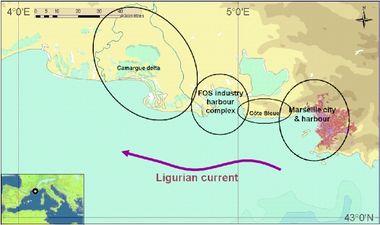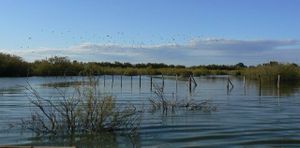Difference between revisions of "Bouches du Rhône"
| Line 21: | Line 21: | ||
Conflicting uses among: | Conflicting uses among: | ||
| − | + | * port area and wetlands; | |
| − | + | * protected areas and recreational activities; | |
| − | + | * urbanisation and wetlands; | |
| − | + | * pollution caused by industries, urban waste, agriculture. | |
<br style="clear:both;"/> | <br style="clear:both;"/> | ||
| Line 35: | Line 35: | ||
To implement and test tools that can help decision makers and stakeholders to: | To implement and test tools that can help decision makers and stakeholders to: | ||
| − | + | * share a common view of the dynamics and the possible futures of this complex territory where multiple anthropogenic pressures are exerted. | |
| − | + | * take appropriate measures to preserve coastal ecosystem services. | |
| − | + | * manage interactions between coastal conflicting usages. | |
<br style="clear:both;"/> | <br style="clear:both;"/> | ||
Revision as of 19:58, 30 June 2011
CASE description
The Coast of the Bouches du Rhone (120 km) is characterised by calanques (rocky shore), urban, industrial zone, delta, sandy beaches. In the dyked area of the Camargue, the sea has gained the upper hand, in part because modification in the hydrological regime and because incursions by the sea are increasing (due to subsidence and the rising level of the Mediterranean).
ICZM phase
Establishment
Main coastal issues
Conflicting uses among:
- port area and wetlands;
- protected areas and recreational activities;
- urbanisation and wetlands;
- pollution caused by industries, urban waste, agriculture.
Objectives
To implement and test tools that can help decision makers and stakeholders to:
- share a common view of the dynamics and the possible futures of this complex territory where multiple anthropogenic pressures are exerted.
- take appropriate measures to preserve coastal ecosystem services.
- manage interactions between coastal conflicting usages.
End Products
Demonstration of selected tools/methods (economic assessment and LEAC for BdR) in the CASE
Tools foreseen to be developed and used
LEAC - Economic Assessment (greening account)
Training needs
LEAC - Economic Assessment
CASE Responsibles
Jean-François Cadiou - Ifremer - email: Jean.Francois.Cadiou@ifremer.fr
Lisa Ernoul - Tour du Valat - email: ernoul@tourduvalat.org


